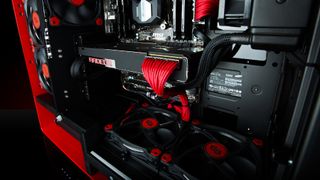AMD's Radeon Pro is the first graphics card tailor made for virtual reality
VR First labs will be powered by these dual-GPU graphics cards

AMD is going to send its dual-GPU Radeon Pro Duo graphics cards to developers at universities, so they can get to work on producing (and enjoying) virtual reality (VR) content.
The company has partnered up with Crytek (of Crysis fame) for the scheme, known as the VR First Initiative, which envisions VR labs being fired up in universities across the globe, helping to spur the grassroots development of virtual reality.
"VR First labs will become key incubators for nurturing new talent in VR development and creating a global community well-prepared to innovate in this exciting and emerging field," Crytek CEO Cevat Yerli commented.
Now you're playing with Pro Duo power
Developers will be provided with Radeon Pro Duo video cards and AMD's LiquidVR SDK, which the company promises is the "world's fastest VR content creator platform" – and naturally it's all compatible with the leading VR headsets, including Oculus Rift and HTC Vive.
The dual-GPU graphics card will also power experiences developed for Microsoft's DirectX 12 – middleware that already allows GPUs to multitask better – with a claimed 16 teraflops of computing performance.
Designed for consumers as much as it is creators, the Pro Duo will allow you to set specific tasks to each of its two GPUs. This means that you can dedicate one chip to your session of the latest game and the other to tasks like web browsing, messaging and more.
AMD plans to release software that will allow you to easily toggle this allocation, Radeon Technologies Group SVP and chief architect Raja Koduri tells us. Then, it's no wonder that the chip maker projects a price of $1,499 (about £1,048, AU$1,996) when the Pro Duo lands in the second quarter of this year.
Get daily insight, inspiration and deals in your inbox
Get the hottest deals available in your inbox plus news, reviews, opinion, analysis and more from the TechRadar team.
Bring the power to the people
Crytek is also granting full source code access to CryEngine development software for free, as well.
The first VR laboratory is actually already up and running at Bahcesehir University in Istanbul, and it's been going since the beginning of the year.
Big things are expected of virtual reality, and not just in the gaming and entertainment spheres, as VR will also have a major impact on experiences like online shopping, education, medicine and more.
But, of course, right now it's mostly about the games – and having pockets deep enough to afford a VR headset and a PC capable enough to run it.
- Also check out: 13 best VR games: best virtual reality games for PC and mobile
Joe Osborne also contributed to this report
Darren is a freelancer writing news and features for TechRadar (and occasionally T3) across a broad range of computing topics including CPUs, GPUs, various other hardware, VPNs, antivirus and more. He has written about tech for the best part of three decades, and writes books in his spare time (his debut novel - 'I Know What You Did Last Supper' - was published by Hachette UK in 2013).
Most Popular




